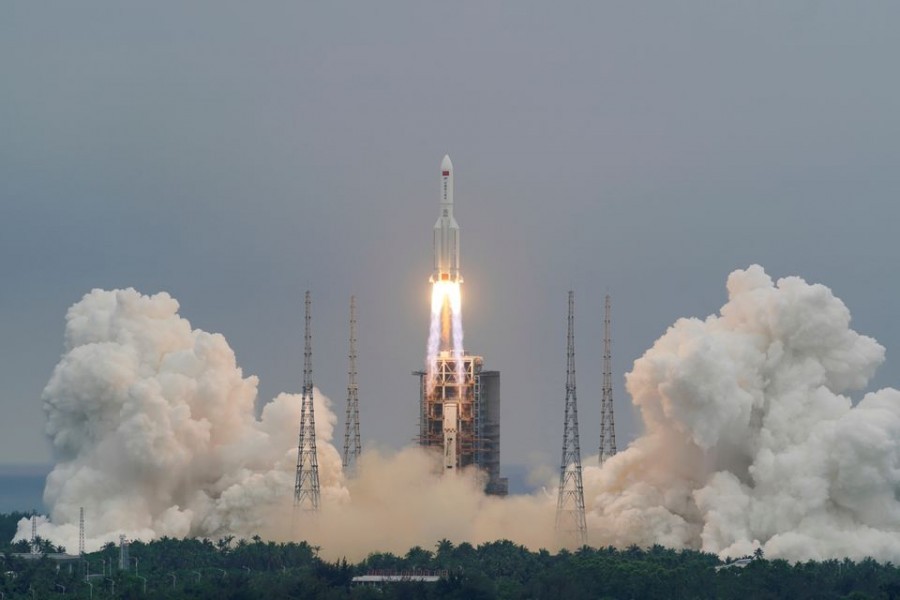News reports about ambitious space programmes undertaken by the rich and advanced nations continue to pour in. Just after the US Mars Mission put into operation its sixth rover on the planet recently, the Chinese Manned Space Agency has disclosed its programme of placing on the Earth's low orbit its own space station. The country hopes to finish the project by the end of 2022. Against these two and scores of other grand space programmes undertaken by the rich, the humble ventures taken up by the developing and the least developed nations could have made news items of a different nature. Thoseought to have been filled with notes of encouragement. Instead, they have elicited derision and disapproval. It has bruised the spirit and confidence of the whole developing bloc. A write-up published in the mid-June (2021) issue of a prestigious weekly published from London has referred to such a reaction expressed by some Britons. In expressing their views on a functional Nigerian satellite, the Britons have apparently stooped so low that many have termed their words 'cruel and mindless'.
Those British people included politicians, and a taxpayers' pressure group. In their reaction to the satellite made and put into operation by Nigeria, the group called for a halt in development aid (to Nigeria). The weekly quoted the said section of the British citizens as saying, "Nigeria did not need help if it could afford a space programme." The incident occurred in 2005, after the Hurricane Katrina devastated large swathes of New Orleans in the Americans state of Louisiana. The people of the large city coordinating the disaster response found themselves in the urgent need of satellite pictures to have an idea of what they were facing. Ironically, they got the required images which were not supplied by NASA satellites or those run by space agencies of other rich countries. The images they received were beamed to Earth by a small spacecraft made by the Sub-Saharan African country --- Nigeria. It had been launched from Russia just two years earlier. The spacecraft cost the 'poor country', Nigeria, just $13 million.
In the following years, the African continent's space programmes continued expanding. According to the British weekly, the credit for launching the most recent orbital venture goes to Mauritius. The country put up its satellite on June 3. Elaborating, the news magazine says at least 20 African countries are conducting space programmes at the moment. They include Egypt and Algeria in the north; and Nigeria, and also smaller countries such as Ghana. In 2019 another five African countries launched satellites, bringing the continent's total to 41 that year. Like the age-old notoriety of Africa being a 'dark continent', the pervasive poverty and economic wretchedness of the Sub-Saharan Africa is also a myth. These notions have chiefly been created by the white supremacists. In the 20th century, the vast continent has produced hundreds of worthy sons of the soil. They include statesmen, social and political leaders, writers, sportsmen, scientists and geniuses in every discipline of life. It's true poverty and internal conflicts, social unrest and instability still cripple many African countries. But the educated people's dreams of seeing an Africa progressing with dignity and self-esteem cannot be undermined. It is especially the younger generations in countries like South Africa, and the Sahel-region nations like Senegal who bubble with dreams of moving forward with a sense of direction. It is the progresses made by the patriotic youths in many branches of science and technology which has prompted South Africa to go for space programmes. It was the country of Nelson Mandela, which built the region's first satellite called SUNSAT. A group of enthusiastic students at Stellenbosch University had successfully accomplished the feat. Upon completion, the satellite was put into orbit by a NASA rocket.
Seeing the African nations' willingness to savour the fruits of space programmes, a Nigeria-based consultancy estimates that African governments earmarked around $500m for their space agencies in 2020. Compared to NASA's expenditure of $23 billion last year, the African total is too paltry to mention. According to sources acquainted with the African space goals, the continent's total projected expenditure still displays a big leap from $325m it spent in 2019. Like the Third World countries, the African governments put forward their cases by saying their investments in space programmes help create local skills. Those are set to woo investment and spillover into many areas of their economies. Employment generation is one of them. Lately, the African students in general are seen being drawn to the discipline of engineering.
The reservations expressed by a section of Britons over Africa's ventures into space do not carry elements of much distress. But there is a stark reality lurking in it. Though small in number, they are tax-paying voters. Few can say for certain that their number one day will not start swelling. Government characters and policies keep changing throughout the world. So are the cases for party manifestos. A faint presence of discomfort lies here. Nobody can say that nations long stuck up in the morass of chronic deprivation and short-changing will not wake up to the 'new realities'. Following a spurt of socio-economic resurgence, nations might go straight for ambitious scientific ventures like those related to orbital rounds and trips to space. China is a luminous instance. So is India. Bangladesh, too, doesn't lag much behind.


